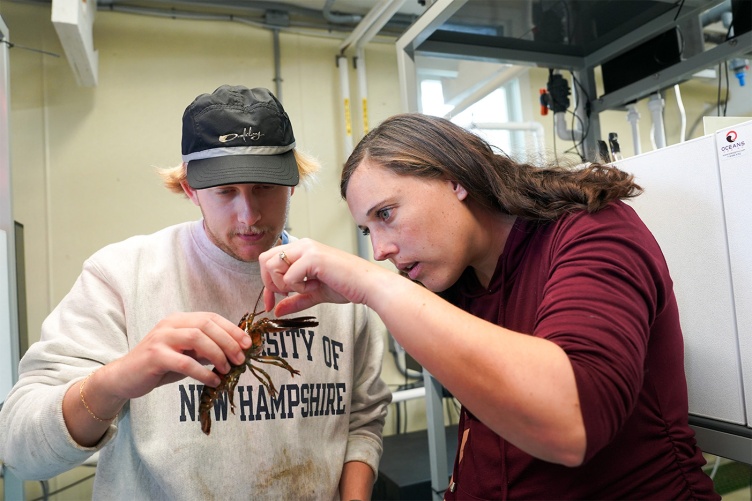
News & Views
New Hampshire researchers explore effects of ocean acidification on juvenile lobsters
January 10, 2024 By Hatchery International staff
 Brittany Jellison and marine biology graduate student Todd Stelling will first study if more acidic ocean water alters predator-prey behaviour in juvenile lobsters. (Photo: Alex Hatch)
Brittany Jellison and marine biology graduate student Todd Stelling will first study if more acidic ocean water alters predator-prey behaviour in juvenile lobsters. (Photo: Alex Hatch) Brittany Jellison, an assistant professor in the Department of Biological Sciences in the UNH College of Life Sciences and Agriculture, is seeking to understand how the recent lack of juvenile lobsters could impact sea life.
Jellison and graduate student Todd Stelling are using a new experimental system at UNH’s Coastal Marine Lab (CML) that enables them to manipulate the chemistry of incoming ocean water. They then can determine how ocean acidification might affect lobster behaviour in response to cues, like the presence of prey.
“If the lobsters cannot locate their prey in a timely manner, it means longer time spent foraging, which leaves them vulnerable to predators. And decreased lobster survival rates will damage the coastal ecosystem and diminish a key fishery for New Hampshire and Maine,” said Stelling.
She started by examining how climate change-driven effects on our oceans could be causing behavioural changes in juvenile lobsters. Higher water temperatures and ocean acidification—a change in water chemistry from an increase in the acidity of ocean waters after it absorbs carbon dioxide from the atmosphere—are threats to ocean life.
“We’re trying to determine how some of our iconic marine species may respond to changing ocean waters and, just as importantly, what that may mean for some of our fisheries,” said Jellison. “Will the behaviour of the American lobster be altered in a more acidic future ocean?”
American lobster is a classic New England delicacy and a key economic industry for New Hampshire, making nearly 70 per cent of the state’s annual commercial fisheries catch and more than US$32.5 million of landed value in 2022 according to NOAA Fisheries.
Past research showed that increased ocean acidity can directly alter the physiology of many marine species. It can decrease reproduction, growth rates and calcification in shelled invertebrates like crustaceans and mollusks. Recent data from the National Oceanic and Atmosphere Administration states that surface ocean waters have dropped 0.1 pH units in the past two centuries, representing approximately a 30 per cent increase in seawater acidity.
The tank system at the CML allows researchers to create customized aquatic environments through automation. The different tanks can have different temperatures and pH levels set, allowing for the testing of multiple variables at once.
In the future, Jellison intends to use the system to generate and control multi-stressor environments. She plans to investigate how combined stressors such as ocean acidification and rising temperatures might interact to affect marine animal behaviour.
“Over time, we may see a drastically different marine environment, where lobsters and other marine species struggle to survive in more acidic waters,” said Jellison. “Our research is a step toward understanding and mitigating these changes, but the bigger picture is clear: we need to address the root causes of ocean acidification to preserve New England’s cherished ocean wildlife, its fisheries legacy and its burgeoning fisheries.”
Print this page
Advertisement
- Hatchery Hack: New year, new hatchery
- Nofima investigates genetically modified canola oil as source for fish feed





